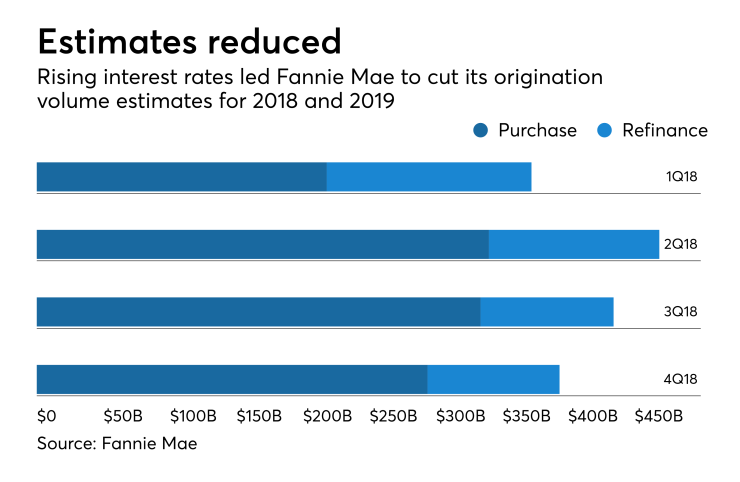Fannie Mae reduced its mortgage origination volume forecast for 2018 and 2019 as rising interest rates are affecting refinancings now, and will curtail purchase activity going forward.
The 2018 forecast was cut to $1.667 trillion from
Where Fannie Mae previously expected rates for the 30-year fixed loan to average 4.4% for the second and third quarters and then rising 4.5% through the end of 2019, the May update has the average for the current quarter rising to 4.5%, before increasing to 4.6% for the following three quarters and 4.7% in the last three quarters of next year. In the fourth quarter of 2017, the average rate was 3.9%.
There were $372 billion of mortgages originated in the first quarter, Fannie Mae said in its May Housing Forecast, with $218 billion in purchase volume and $154 billion in refis. That was $14 billion lower than what Fannie Mae projected in April's forecast; it thought the quarter would end with $386 billion in volume, with $219 billion of purchase loans and $167 billion of refi loans.

For the current quarter, while Fannie Mae did not cut its purchase forecast of $340 billion, it now expects $129 billion of refi volume, down from April's projection of $132 billion.
While for the remaining two quarters of 2018 and all of 2019 Fannie Mae did not adjust its refinance volume outlook, it did cut its purchase activity projections.
In the third quarter, Fannie Mae now projects $334 billion of volume, a reduction of $3 billion from April's outlook. Fourth-quarter expected purchase volume of $394 billion is $2 billion lower. For the first and second quarters of 2019, Fannie Mae cut the purchase volume forecast by $3 billion for each period, while it cut the forecast by $5 billion each of the third and fourth quarters.
"We remain confident that, despite a first-quarter hiccup, economic growth will pick up through the rest of 2018. There are signs that consumer spending is poised to strengthen in the months ahead, and we believe recent fiscal policy actions are likely to contribute to growth this year," said Fannie Mae Chief Economist Doug Duncan in a press release.
"Come 2019, however, we expect the fiscal boost to fade, and we adjusted our forecast lower accordingly. Meanwhile, housing's upward grind should continue, despite a lackluster first quarter. We expect home sales to post modest gains both this year and next, as prices rise and affordability declines amid low for-sale inventory."
While Duncan still projects 2.5% year-over-year growth in total home sales, he cut his forecast for 2019 to 6.375 million total home sales from 6.439 million, or to 1.5% year-over-year growth from 2.6%.




